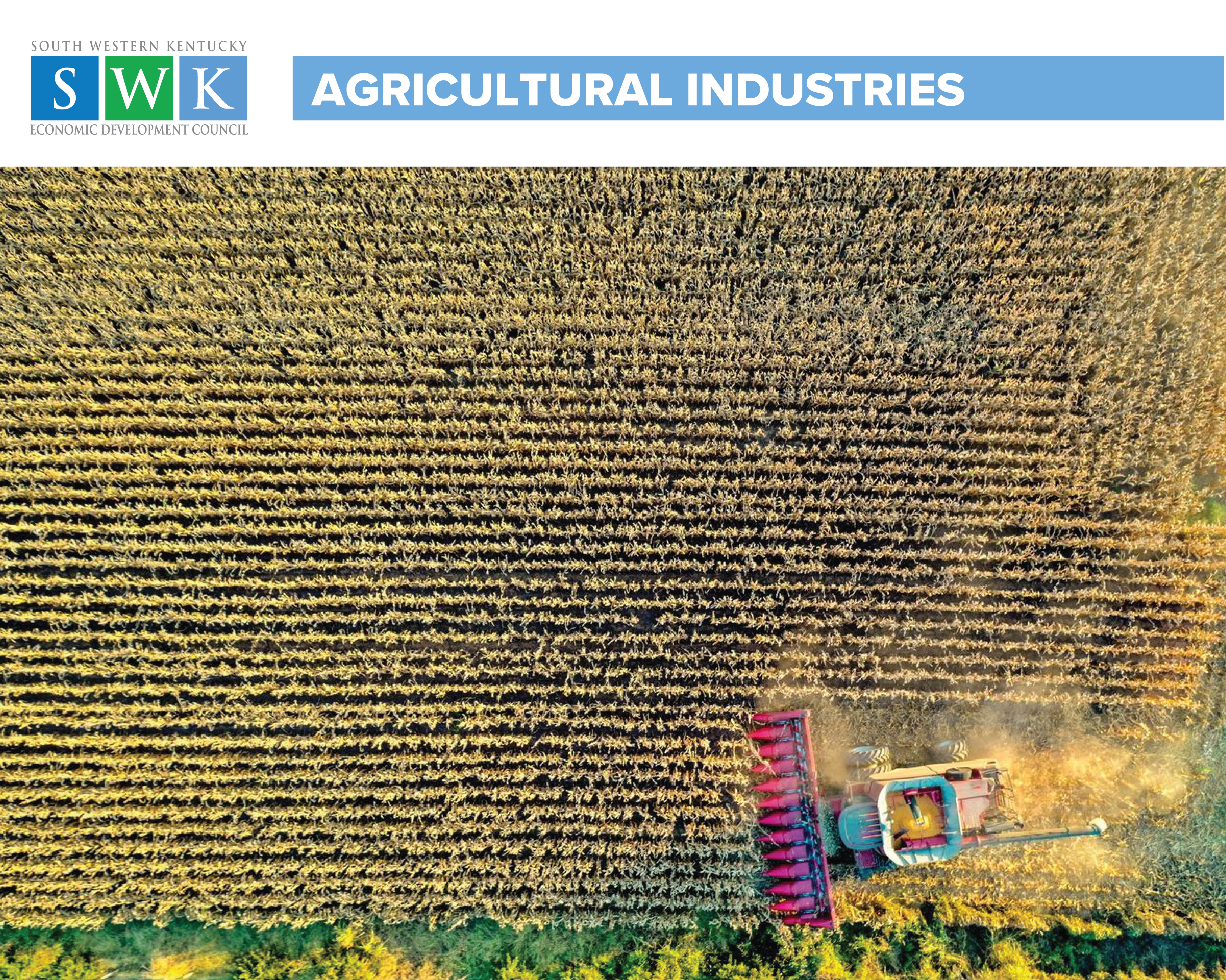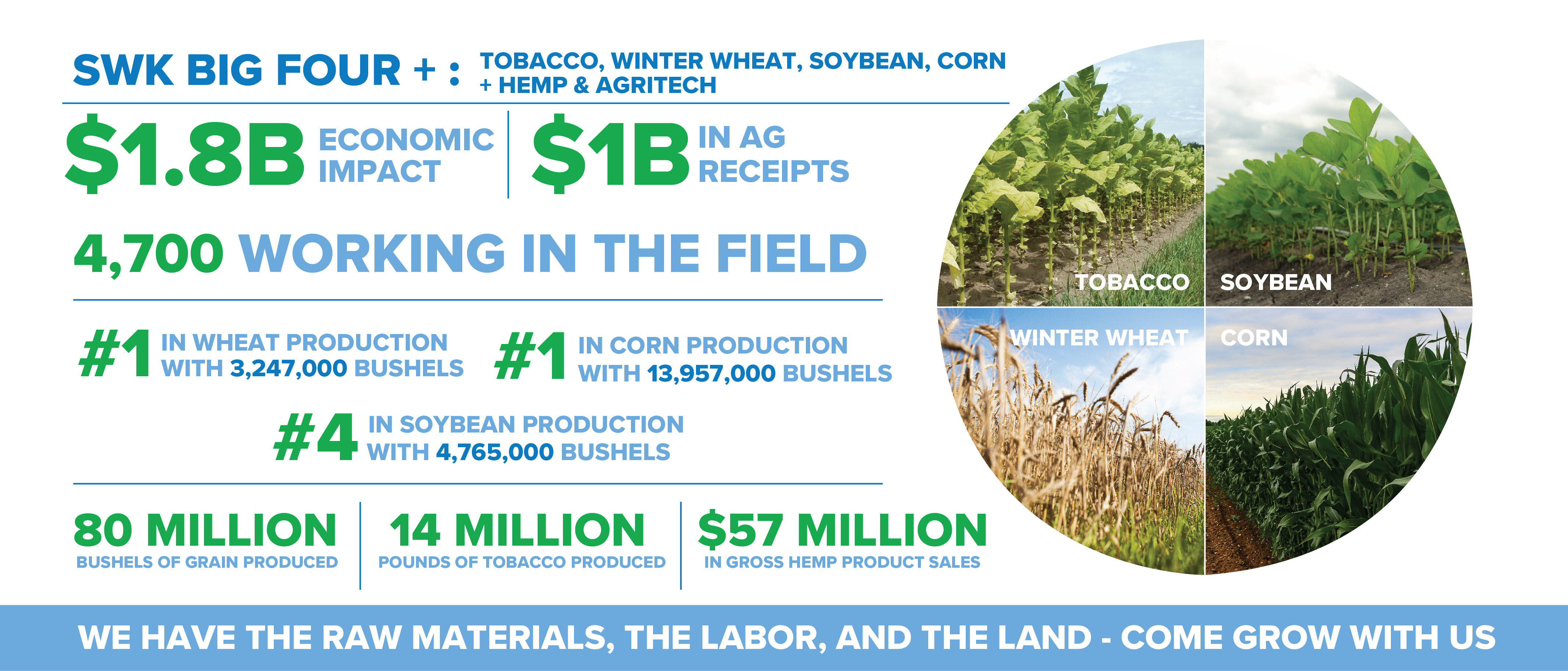Agricultural Industries

Jobs in the Agricultural Sector

Come Grow With Us
Located in the middle of America’s manufacturing and agricultural heartland, South Western Kentucky is home to the most fertile lands and hardest working hands. The region enjoys unparalleled beauty in our rolling hills, fertile fields, and natural waterways and outstanding location being an easy day’s drive from 86% of the country’s population. With easy access to interstate, rail, ship, and plane, you or your company’s products can be anywhere in the world in just a matter of hours.
But, there’s so much more to this region which boasts the home of Fort Campbell, Kentucky. The home of the 101st Airborne Division (Air Assault), 5th Special Forces, and 160th Special Operations houses over 27,000 soldiers and their 59,000 family members along with over 150,000 veterans and retirees in our region. This economic engine is a major source of our available, reliable, and skilled workforce with over 450 soldiers transitioning into our region every month.
Our proud military heritage is only surpassed by our long reputation as the home of the nation’s most fertile lands. Our fields, shaped by glaciers centuries ago and fed by nutrient rich natural waterways, produce nation leading crops like winter wheat, soybeans, corn, burley tobacco, and increasingly alfalfa, canola and hemp. These crops serve as raw materials in some of our most successful industries in food processing, ethanol, and distilleries throughout the region.
Our land produces more than record yielding crops with over 61 manufacturers located in the SWK with 21 internationally owned representing 11 unique countries. Our region has seen tremendous manufacturing growth in our fertile lands because of our hard-working hands. Industries located in the SWK include agriculture, automotive, advanced manufacturing, defense and aerospace, and distribution. In total, over 12,000 regional residents come to work daily in manufacturing in the SWK. Businesses, like crops, grow strong and fast in our region.
Other key production includes burley tobacco, alfalfa hay, other hay, cattle, and calves and milk production. The USDA and Kentucky Department of Agriculture statistics indicate total crop receipts and total livestock receipts added up to nearly $105 million in 2006.
The county is the second largest in area in Kentucky at 722 square miles and has an estimated 1,023 farms with over 300,000 acres of farmland, with 221,000 acres in cropland.
While industry continues to be a vital growth factor and has supplanted considerable farmland, other acreage has been cleared so that we actually have more working farmland today than we did five years ago.

The SWK region is also home to a bustling population of over 100,000 and nearly 500,000 in the six-county labor shed. Locals aren’t surprised that newcomers are flocking to our region as they’re discovering what locals have known all along. The SWK is a less taxing, more relaxing environment for people of all ages and interests.
Boasting the youngest population in the state while being a retiree destination point along the shorelines of our local lakes, the SWK region is home to a diverse, energetic, innovative, and compassionate population. Low cost of living, great housing, safe streets and neighborhoods, outstanding schools, and charming award-winning communities are major contributors to why so many are choosing to live, work, and play in the SWK.
Our climate is temperate with moderately cold winters and warm summers. This results in an average annual temperature of 57 degrees. Normal rainfall for the year is 50 inches. Precipitation is fairly well distributed throughout the year. The least rainfall usually occurs in August, September, and October. The wettest months are usually March and December. The growing season averages 194 days. The first killing frost occurs the third week of October.
Agriculture has become a highly technical industry and our farmers realized the need for continuing education and technical training concerning implements, machinery, fertilizers, chemicals, seeds, and overall good farming practice. Because of this progressive attitude, Christian County continues to be an agricultural leader and example of good farming practices. The Hopkinsville Community College has a technical center specializing in agricultural classes. FFA classes at local high schools have over 200 members. The local 4-H group is extremely active serving over a thousand members in a variety of subjects.
Several grain, food and fuel processing and manufacturing plants have located here and more are expected. This provides an “on-site” market for local farmers and industry as well.
The Chamber of Commerce maintains an Agri-Business Committee that promotes “Ag Week”. The Agri-Business Committee promotes local agriculture with two events annually with a media blitz via newspaper, radio, and television; one in March during National Agriculture Week and again in July during Christian County Agriculture Week. It honors local farmers in the following four fields; Agri-Business of the Year, Farmer of the Year, Distinguished Service, and Friend of Agriculture. The committee also awards scholarships each year to a student who will pursue an agricultural course in college.
Agriculture is America's Number 1 Export and generates 235 of the U.S. Gross Domestic Product.

With outstanding education opportunities and access to over 450,000 workers in our labor shed, the SWK is blessed to have an available, reliable, and skilled workforce ready to help the next business locate, grow, and/or expand.
Jobs in the Agricultural Sector
Companies:
- Siemer Milling
- Krusteaz
- Commonwealth Ag Energy
- Martin Industries
- Delavan Ag Pumps
- Bestway Ag
- Ag Spray Equipment
- Hopkinsville Elevator
- AGRI-CHEM
- H & R Agri Power
- Hopkinsville Milling
- Cal-Maine Foods
Types of Jobs:
- Assembly (Welding)
- Machine Operators
- Warehouse
- Maintenance
- Tool & Dye
- Engineering (mechanical, electrical, chemical, and process)
- Logistics
- Milling
Highlighted Skills Preferred and/or Required:
- Welding
- CDL
- Maintenance Tech
- Logistics/ Supply Chain Management
Average Wages:
- Untrained employees' starting pay is in the $17.00 to $18.00 range
- Max out pay is in the $22.00 to $24.00 range
-
Maintenance and Tool & Dye have starting pay at $25.00 to $27.00
-
Maintenance and Tool & Dye max out pay is $33.00 to $35.00 range
Highlighted Regional Training Opportunities:
- Christian County Public Schools Agricultural Program
- Todd County Public Schools Agricultural Program
- Trigg County Public Schools Agricultural Program
- Hopkinsville Community College Workforce Solutions/ HOPFAME
- Murray State University College of Agriculture
- Western Kentucky University College of Agriculture
- Austin Peay State University Department of Agriculture
Add to Report View Report
As you navigate our website, you can use the “Add to Report” button to add any page or property to a custom report that you can print out or save.







